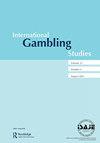The customer-brand relationship in the gambling industry: positive play predicts attitudinal and behavioral loyalty
IF 2.5
3区 心理学
Q2 SUBSTANCE ABUSE
引用次数: 2
Abstract
ABSTRACT This research draws on the model of positive play (i.e. responsible gambling) to investigate whether positive play beliefs (e.g. accurate understanding about the odds of success on games of chance) and behavior (e.g. setting a limit on gambling expenditures) are associated with attitudinal loyalty and behavioral loyalty. Results from Study 1 indicated that among American casino loyalty program members (N = 188), positive play was predictive of attitudinal loyalty when controlling for disordered gambling symptomatology. In Study 2, using survey and player-account data from 383 members of a Canadian casino loyalty program, we found that positive play was negatively associated with behavioral loyalty, but that this association was eliminated after accounting for disordered gambling symptomatology. These results suggest that fostering positive play may help increase positive perceptions of a casino and its loyalty program without undermining the amount of money a player spends at that casino.博彩业的客户品牌关系:正向博弈预测态度和行为忠诚度
本研究利用积极游戏(即负责任的赌博)模型来调查积极游戏信念(如对机会游戏成功几率的准确理解)和行为(如对赌博支出的限制)是否与态度忠诚和行为忠诚相关。研究1的结果显示,在美国赌场忠诚计划成员(N = 188)中,当控制赌博紊乱症状时,积极游戏可预测态度忠诚。在研究2中,我们使用来自383名加拿大赌场忠诚计划成员的调查和玩家账户数据,发现积极的游戏与行为忠诚呈负相关,但在考虑了紊乱的赌博症状后,这种关联被消除了。这些结果表明,培养积极的游戏可能有助于增加对赌场及其忠诚度计划的积极看法,而不会影响玩家在赌场花费的金额。
本文章由计算机程序翻译,如有差异,请以英文原文为准。
求助全文
约1分钟内获得全文
求助全文

 求助内容:
求助内容: 应助结果提醒方式:
应助结果提醒方式:


